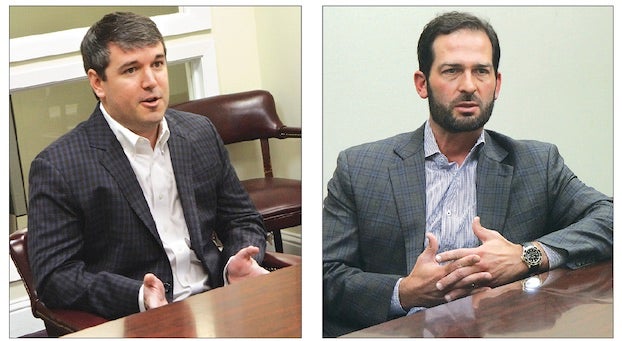Helping clients navigate charitable giving
Published 6:24 am Sunday, September 4, 2022

- Left: Kody Cannon, a partner at Sigler, Arabie and Cannon who specializes in estate planning, said philanthropy is important to his clients who have a charitable heart. Right: Stephen Liles, a certified financial planner and partner at Oak Grove Wealth Partners, said some of his client’s charitable donations are driven by a need for a tax deduction. (Donna Price / American Press)
Most recognize the importance of charitable organizations and appreciate the efforts of the full-time staff and volunteers. Some even offer monetary contributions. Often, however, these organizations can be forgotten during estate planning.
When planning for bequests, there are a number of ways charitable giving can be accomplished to continue making an impact — particularly on causes important to Southwest Louisiana.
The Community Foundation Southwest Louisiana will present a continuing education seminar for financial advisors, attorneys and certified public accountants to discuss charitable giving trends, tactics and structures as well as options available in family philanthropy. The seminar is set for 8 a.m.-noon Friday, Sept. 23, at L’Auberge Casino Resort.
“It’s a good way for accountants, attorneys and financial advisors to be reminded of all that goes into charitable giving,” said Kody Cannon, a partner at Sigler, Arabie and Cannon who specializes in estate planning. “It’s a sophisticated area and it’s important to our clients who have a charitable heart and wish to continue providing benefits to charities either during their life or at their death. It gives us a reminder of those planning opportunities and perhaps an update on the current status of the law and new strategies that can be implemented so that we can have that front of mind when we’re meeting with clients.”
Cannon said during a previous seminar on charitable giving, the speaker cited a survey that found most financial advisers don’t ask their clients about charitable giving.
“A survey asked potential clients how often do they expect to be asked about charitable giving and do they want to be asked about it,” Cannon said. “The majority said they do want to be asked about it and they’re open to discussing it. There’s a disparity there and a missed opportunity.”
Cannon said it’s something he’s taken to heart.
“I now include that in my meetings with clients,” he said.
The same rings true for Stephen Liles, a certified financial planner and partner at Oak Grove Wealth Partners.
“We always try to discuss with our clients what’s important to them from a giving standpoint,” he said. “A lot of our clients have multi-generational wealth and they want to be able to engage their children in having a charitable heart so we talk to them from a philanthropy standpoint about how they want their kids to be involved in those giving processes.”
Liles said one of the great things he finds with the local Community Foundation is the ability to establish a donor-advised fund on behalf of one’s family to engage multiple levels of that family in making decisions on who receives those gifts from the funds established at the foundation.
Liles said some of the charitable donations given by his clients are driven by a need for a tax deduction after selling a business.
“Once they’ve realized a significant gain with significant income on a continual basis the need for deductions for the client is what typically brings up additional conversations around giving,” Liles said. “In the event the client needs a deduction, they can make a gift or establish a donor-advised fund at the Community Foundation and get an itemized deduction typical for high-wage earners.”
Liles said attorneys who attend the seminar will earn CLE credits, CPAs will earn CPE credits and financial planners will earn CFP credits.
“Not only do we get value from a planning perspective, because tax laws change every year, but we get the value of a continued education,” Liles said.
“Plus there’s networking opportunities,” Cannon added. “You get to see the financial advisors, the accountants and it is important that there’s a community of us working together because it does require a team for particularly significant donations and you need to have everyone on the same page.”
Conference speaker Kathryn Miree, president and primary consultant for Kathryn W. Miree & Associates, said Americans remain highly philanthropic despite the uncertain economy and in 2021 gave more than $484 billion to charity — 76 percent of which came from private donors.
“From my perspective, this means professional advisors must be able to have that conversation with their clients,” Miree said. “These sessions focus on practical, tax-smart ways individuals can meet their personal and charitable goals by using the asset, the gift form, and the timing that is the best fit for that donor whether they are making a single gift or creating a charitable foundation or foundation substitute.”
Miree said she often finds advisors are most surprised by the level of charitable giving in this country at all economic levels.
“Only about 10 percent of all taxpayers itemize, yet a study from the Lilly School of Philanthropy at Indiana University shows 49.6 percent of all households gave to charity in 2018,” she said. “Giving is part of the U.S. culture. They’re also surprised at the power of very simple charitable planning techniques. There seems to be so much emphasis on large gifts and complex gifts. Yet simple ideas such as using long-term appreciated assets to make gifts, or using your IRA if you are age 70 1/2 or older are within everyone’s reach and leverage giving capacity.”
Miree, who is past board chair of the Birmingham Community Foundation, said there are tremendous benefits in donating to community foundations that many people may not know are available.
“I have worked with so many donors who want to maximize the impact of their gifts by expanding their knowledge of what’s going on in the community, and identifying those charities that are innovative and strategic in the way they approach their work,” she said. “I often send them to their local community foundation because there is no organization that knows more about nonprofits in the community and can help identify those creative, effective organizations like the community foundation. In addition to connecting donors to organizations that they have reviewed and often funded, they have staff that can guide the giving process, accept non-cash gifts, and create funds that make grants to multiple types of organizations. Community foundations are a full-service philanthropic platform.”
She said she has been working with donors to create blended gifts that combine a current gift and an estate gift to meet a single goal when paying the full amount during life is not financially possible. Another option is virtual endowments.
“A donor creates an endowment which will be funded through their estate, but makes payments during life equal to the amount the endowment will ultimately generate when funded,” Miree said. “This allows the donor to see the impact of the gift during their lives, without having to fund the full endowment during life.”
She also encourages donors to consider using long-term appreciated non-cash gifts such as stock to make their gifts.
“This allows them to get a double tax benefit,” she said. “They receive a charitable deduction (if they itemize) and avoid capital gains on the appreciation in the contributed property. The ideas are simply ways to expand the capacity of the donor and to maximize the impact on charity.”
In addition to presenting “Current Charitable Giving Trends, Tactics and Structures,” during the seminar, Miree will also cover “Seven Options in Family Philanthropy.”
“I have found that advisors rack their brains trying to figure out the seven options,” she said. They can easily identify private foundations and supporting organizations. Some may even identify donor advised funds. But the remaining four choices are a mystery. I hope advisors will attend to learn what those other options might include.”
♦
To register for the conference, visit foundationswla.org.





